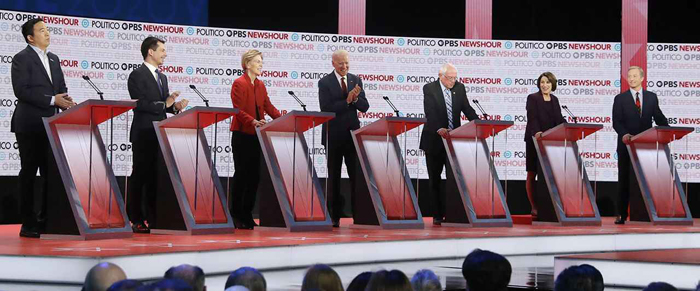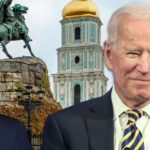By Paul Steinhauser | Fox News
With less than six weeks to go until the Iowa caucuses kick off the presidential nominating calendar, there’s no clear front-runner in the Democratic race.
And that’s fueling speculation America could see something not witnessed in more than a half-century – a convention that goes beyond a first ballot, known in the history books as a brokered or contested convention.
THE LATEST FROM FOX NEWS ON THE 2020 PRESIDENTIAL CAMPAIGN
“It could happen,” said the Democratic National Committee’s Kathy Sullivan.
The longtime DNC Rules Committee member from New Hampshire added that “it would be exciting to see it go past the first ballot because it would be so unusual.”
For now, her assessment of that likelihood still falls into the lane of possible, but not probable. “It’s been a long, long, long time since there’s been a second ballot at a Democratic convention,” Sullivan said.
In fact, the last time either of the major party nominating conventions went past a first ballot was 1952, when Adlai Stevenson won the Democratic nomination on the third ballot.
But this time around, a number of conditions could lead to no candidate holding a clear majority of delegates heading into the July Democratic convention in Milwaukee. This could trigger a titillating scenario where so-called “superdelegates” — party elders and insiders who recently were stripped of their power in the wake of the 2016 primary battle — would be activated, and free to boost the candidates of their choice toward the nomination.
So what’s driving the chatter?
First: The Democrats are heading into the kickoff of the primary calendar with no front-runner and a solid top tier of four candidates – former Vice President Joe Biden, Sens. Bernie Sanders of Vermont and Elizabeth Warren of Massachusetts, and South Bend, Ind., Mayor Pete Buttigieg.
Second: The rise of grassroots, small-dollar, online donations. Sanders was able to battle eventual nominee Hillary Clinton through the end of the 2016 primary calendar thanks to a continued infusion of grassroots contributions. This time around, Sanders, Warren and even a candidate like tech entrepreneur Andrew Yang could see their campaigns fueled by people-powered donations deep into the primary process. The increased power of online contributions is blunting the one-time clout of wealthy donors backing more establishment candidates – such as Biden or even Buttigieg.
KARL ROVE: DEMOCRATIC NOMINATION MAY NOT BE SETTLED UNTIL JULY CONVENTION
Third: The billionaires. Former New York City Mayor Mike Bloomberg and environmental advocate Tom Steyer are pouring hundreds of millions of their own dollars into their campaigns. If either of them are still in the hunt by April, their own money will keep them going, even as small-dollar donations fuel their competitors.
Fourth: A front-loaded calendar. Between the kickoff in Iowa on Feb. 3 and mid-March, roughly three-quarters of all convention delegates up for grabs will be awarded.
Sullivan spelled out a scenario where three or four contenders are still standing heading into April – each far short of the 1,919 delegates needed to clinch the nomination on the first ballot.
“You’d have to have a situation where multiple candidates come out of the first four states with wins,” she explained. “You’d go into Super Tuesday and have some candidates concentrating in certain states, others in other states, because it’s very expensive to run in all the states on Super Tuesday. Not all the candidates can afford to do that.”
“So if we come out of Super Tuesday with no clear leader and then it becomes a state-by-state contest and then we end up in New York towards the end of April. If after that point we still don’t have [a clear leader], then yes, it goes to the convention and conceivably a second ballot,” she added.
Fifth: Superdelegates are no longer able to tilt the balance toward a favored candidate before the convention begins. Superdelegates – Democratic governors, senators, representatives, former high-ranking lawmakers and leading party officials – overwhelming backed Clinton in 2016. After the election, as a fig leaf to Sanders and his army of progressive supports, the DNC rolled back the influence of those superdelegates. They are only unbound if the convention reaches a second round.
Add all these factors together, and a contested convention doesn’t seem so farfetched.
That said, if a candidate gets hot in the early states, the nomination race could be over quite quickly. That was the case in 2004 when then-Sen. John Kerry of Massachusetts wrapped things up early in the calendar.
But if the battle goes to a second ballot in Milwaukee, Sullivan said don’t expect to see a repeat of the contested conventions from the history books.
“People refer to brokered conventions, which leads you to think of people in smoke-filled rooms making deals, cutting deals,” she said. “I don’t think you’re going to see deal-making going on because all these people [delegates] are free agents. It would be a very democratic process.”Paul Steinhauser is a politics reporter based in New Hampshire.






